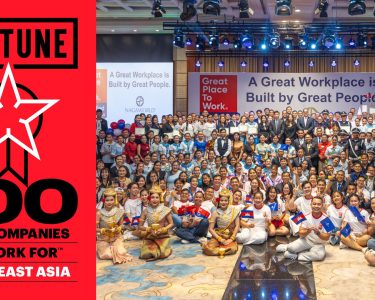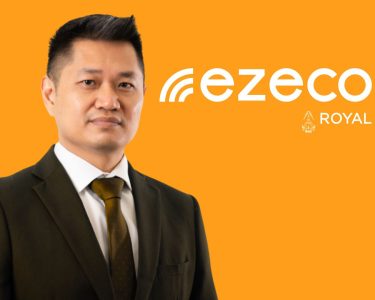Stew Post
For this week’s interview, the Communications team spoke with Denis Barre, co-founder of Convergences Executive Search. Over the course of a wide-ranging conversation with Senior Communications Officer Stew Post, they discussed Denis’ experience in Cambodia starting in the 1990s, the evolution of the executive talent pool over the years, and how his firm stands out from other HR service providers.
Stew: Let’s start from the beginning—what first brought you to Cambodia and what inspired you to start Convergences?
Denis: I first came to Cambodia in the early 1990s, shortly after completing my business degree. My initial work was in the hospitality sector in Phnom Penh, and I was immediately struck by the country’s energy and potential. It was a transformative time—peace was taking hold, and there was a sense of hope for progress in areas like health, education, and personal freedom.
Over the years, I moved between Cambodia and Canada, eventually spending more than two decades working in Human Resources and Corporate Services for large industrial organisations in North America. That experience gave me a deep understanding of strategic HR, operational leadership, and organisational development.
In recent years, I felt a strong pull to return to Cambodia on a more permanent basis. I saw an opportunity to contribute meaningfully by sharing my knowledge and experience in a context where it could truly make a difference. That’s what inspired me to found Convergences Human Resources—a firm dedicated to supporting organisations in Cambodia with best-in-class HR practices, executive recruitment, and strategic consulting tailored to the local environment.

Stew: Convergences Executive Search offers a unique blend of services—from executive recruitment to consulting and outsourcing. What makes your approach stand out in the Cambodian market?
Denis: Convergences was founded by three partners who bring together deep HR subject matter expertise, strong connections to the regional talent pool, and a solid understanding of the Cambodian business landscape. This combination allows us to deliver not only best-in-class operational services—such as executive search and payroll administration—but also the more strategic, often underdeveloped aspects of Human Resources.
We partner with our clients to bring top talent and to implement strategic HR programs such as performance management frameworks, succession planning processes, and compensation strategies that are designed to support long-term organisational goals. These elements are often missing in the local market, where many providers focus primarily on the tactical side of recruitment.
What truly differentiates Convergences is our ability to connect global HR best practices with the realities of doing business in Cambodia. Our understanding of business drivers, combined with our practical experience and regional insight, allows us to deliver tailored, results-oriented solutions that go beyond simply filling roles—we help build sustainable organisations.
Last but not least, Convergences Executive Search is part of a large regional network (Executive Search Asian Partners – ESAP) that gives our clients access to an unlimited Talent Pool in virtually all sectors of the economy.
Stew: From your perspective, how has the executive talent landscape in Cambodia evolved over the past decade? Are there any shifts you find particularly promising or concerning?
Denis: Over the past decade, we’ve witnessed two major developments that are shaping the executive talent landscape in Cambodia.
First, there has been significant progress in the development of local workforce competencies. We now see Cambodian professionals with 15 to 20 years of hands-on experience across a range of industries. While there is still room for growth, this generation of talent is increasingly stepping into leadership roles and bringing a depth of local knowledge and operational expertise that was previously limited.
Second, we are seeing the emergence of a mobile, regional talent pool—professionals from neighbouring countries or Cambodians returning from abroad—who are well adapted to the realities of the Cambodian market. These individuals bring international exposure, technical knowledge, and the ability to integrate seamlessly into the local business environment.
The combination of these two trends is very promising. It enables employers in Cambodia to access true subject matter expertise that is both attuned to the local context and competitive on a regional or global scale. This evolution makes it increasingly feasible for companies to build leadership teams that can drive innovation and sustainable growth from within.
Stew: In your view, what skills and qualities will be most important for the Cambodian workforce in the next decade?
Denis: In the next decade, soft skills such as emotional intelligence, adaptability, and effective communication will be critical for the Cambodian workforce. These qualities enable individuals to navigate complex interactions and foster collaboration, which are essential in a rapidly changing global environment. Developing a transformational mindset will empower employees to embrace continuous learning and innovation.
Globally, competencies like cultural awareness, digital literacy, and strategic thinking are becoming increasingly vital. As Cambodia integrates more into the international market, employees must cultivate these skills to remain competitive and contribute positively to cross-cultural teamwork and global projects. A strategic mindset will also help individuals navigate uncertainty and drive organisational growth.
To equip candidates with these essential competencies, organisations should prioritise internal programs focused on soft skills development. Workshops, coaching, and mentorship initiatives can foster emotional intelligence and strategic thinking, transforming how employees approach their roles. Investing in such programs ensures a future-ready workforce capable of adapting to evolving market demands and contributing meaningfully to national development.

Stew: In your experience, what are the most common HR pitfalls that growing companies in Cambodia face—and how can they avoid them?
Denis: One of the most common pitfalls I see is the lack of deliberate investment in career management and retention strategies. Many growing companies remain reactive when it comes to HR—responding only when challenges arise—rather than building proactive, long-term plans to support and develop their people.
The best way to predict the future is to shape it. If employees don’t see a clear path for growth, or if their performance isn’t being guided and supported, it becomes very difficult to sustain engagement and productivity. People, more than any other asset, require consistent investment if we expect them to perform at a high level over time.
To avoid this, companies need to establish a coherent set of HR programs that align with their strategic goals. This includes clear performance management systems, structured career development pathways, succession planning, and regular communication around business direction and employee contributions.
When these elements are in place, HR becomes a driver of stability and growth rather than a point of crisis. In a competitive and evolving talent market like Cambodia’s, this shift is not just advisable—it’s essential.
Stew: Finally, what advice would you give to business leaders—local or foreign—who want to build stronger teams and make a lasting impact in Cambodia’s fast-moving market?
Denis: It may sound like a cliché, but it’s undeniably true: people are a company’s most valuable asset. Every organisation, at some point in its lifecycle, comes to this realisation—often after experiencing the cost of neglecting it.
My advice to business leaders is to take a step back and regularly check the pulse of your organisation. Ask yourself: What people-related challenges are on the horizon? How can we proactively address them? What steps can I take today to improve productivity through better people management?
This falls into the category of “important but not urgent”—a space that leaders often overlook in favour of putting out fires. But investing time in these foundational people programs—whether it’s workforce planning, leadership development, or employee engagement—pays dividends in the long run. It builds the stability and alignment needed for sustainable growth, especially in a fast-evolving market like Cambodia.
By making intentional, forward-thinking investments in your teams, you’re not only building a stronger organisation—you’re also setting the stage for lasting impact.





